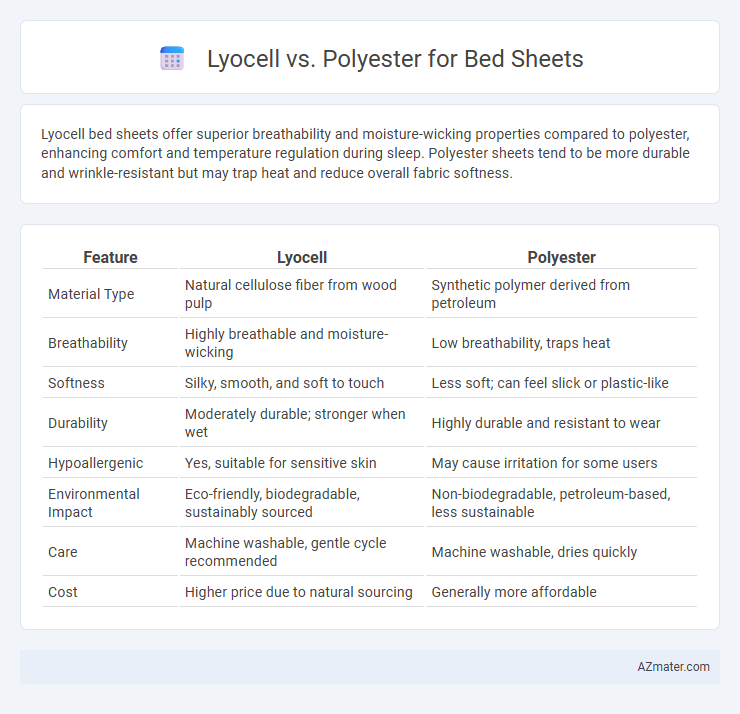Lyocell bed sheets offer superior breathability and moisture-wicking properties compared to polyester, enhancing comfort and temperature regulation during sleep. Polyester sheets tend to be more durable and wrinkle-resistant but may trap heat and reduce overall fabric softness.
Table of Comparison
| Feature | Lyocell | Polyester |
|---|---|---|
| Material Type | Natural cellulose fiber from wood pulp | Synthetic polymer derived from petroleum |
| Breathability | Highly breathable and moisture-wicking | Low breathability, traps heat |
| Softness | Silky, smooth, and soft to touch | Less soft; can feel slick or plastic-like |
| Durability | Moderately durable; stronger when wet | Highly durable and resistant to wear |
| Hypoallergenic | Yes, suitable for sensitive skin | May cause irritation for some users |
| Environmental Impact | Eco-friendly, biodegradable, sustainably sourced | Non-biodegradable, petroleum-based, less sustainable |
| Care | Machine washable, gentle cycle recommended | Machine washable, dries quickly |
| Cost | Higher price due to natural sourcing | Generally more affordable |
Overview: Lyocell and Polyester Bed Sheets
Lyocell bed sheets are made from sustainably sourced wood pulp, offering exceptional breathability, moisture-wicking properties, and a silky smooth texture that enhances sleep comfort. Polyester bed sheets, composed of synthetic fibers, provide durability, wrinkle resistance, and affordability but tend to trap heat and lack breathability compared to natural fibers. Choosing between Lyocell and polyester depends on prioritizing eco-friendliness and softness versus cost-effectiveness and longevity in bedding materials.
Material Origins and Production Processes
Lyocell is a natural fiber derived from sustainably sourced wood pulp, primarily eucalyptus, processed through an eco-friendly closed-loop production that recycles water and solvents. Polyester, a synthetic fabric, is produced from petrochemical polymers through energy-intensive processes involving polymerization of ethylene glycol and terephthalic acid. Lyocell's biodegradable nature contrasts with polyester's non-biodegradable composition, influencing sustainability and environmental impact in bed sheet production.
Texture and Comfort Comparison
Lyocell bed sheets offer a smooth, silky texture that enhances breathability and moisture-wicking properties, making them ideal for sensitive skin and hot sleepers. Polyester sheets tend to have a denser, less breathable texture, often feeling less soft and trapping heat, which can reduce overall comfort. Consumers seeking luxurious softness with temperature regulation typically prefer Lyocell over polyester for superior sleep quality.
Moisture Wicking and Breathability
Lyocell bed sheets offer superior moisture-wicking properties due to their natural cellulose fibers derived from eucalyptus trees, which efficiently absorb and release moisture, keeping sleepers dry. Polyester sheets, composed of synthetic fibers, tend to trap heat and moisture, resulting in reduced breathability and increased discomfort during sleep. The breathable structure of Lyocell enhances air circulation, making it a preferred choice for those seeking cool and dry bedding.
Durability and Longevity
Lyocell bed sheets offer superior durability due to their natural cellulose fiber structure, which resists pilling and maintains softness through multiple washes. Polyester sheets, while highly resilient to tearing and wrinkles, tend to degrade faster under high heat and frequent laundering, leading to fiber breakdown and reduced lifespan. Choosing Lyocell ensures long-lasting comfort with enhanced breathability and sustained fabric integrity, making it a preferable option for durable bedding.
Environmental Impact and Sustainability
Lyocell bed sheets are derived from sustainably sourced wood pulp using a closed-loop production process that recycles water and solvents, significantly reducing environmental impact compared to polyester. Polyester, a petroleum-based synthetic fiber, contributes to microplastic pollution and releases greenhouse gases during manufacturing and washing. Choosing Lyocell promotes biodegradability and lower carbon footprints, aligning with eco-friendly and sustainable bedding choices.
Maintenance and Care Requirements
Lyocell bed sheets require gentle washing in cold water with mild detergent and air drying to maintain their softness and durability, while polyester sheets are more resilient, allowing machine washing in warm water and tumble drying at low heat without significant damage. Lyocell fibers demand less frequent washing due to their moisture-wicking and antibacterial properties, reducing maintenance effort compared to polyester, which can trap heat and odors, necessitating regular cleaning. Proper care for lyocell includes avoiding bleach and fabric softeners to preserve fiber structure, whereas polyester is more tolerant of harsh chemicals but may pill over time with improper maintenance.
Allergenicity and Skin Sensitivity
Lyocell bed sheets are highly favored for their hypoallergenic properties, making them suitable for individuals with sensitive skin or allergies due to their natural cellulose fibers that resist dust mites and bacteria. Polyester sheets, made from synthetic fibers, tend to trap heat and moisture, potentially aggravating skin sensitivities and triggering allergic reactions. Choosing Lyocell promotes better skin comfort and reduces allergen exposure, enhancing sleep quality for sensitive users.
Price and Value for Money
Lyocell bed sheets typically cost more than polyester options due to their sustainable production process and eco-friendly fibers derived from wood pulp. Polyester sheets offer budget-friendly prices but may lack breathability and moisture-wicking properties, which can affect overall comfort and durability. Investing in Lyocell provides better long-term value for money through enhanced softness, temperature regulation, and biodegradability despite the higher initial price.
Final Verdict: Which is Better for Your Bed Sheets?
Lyocell bed sheets offer superior breathability, moisture-wicking properties, and a silky-soft texture that enhances comfort and promotes better sleep quality. Polyester sheets are more durable, wrinkle-resistant, and budget-friendly but can trap heat and lack the natural feel of Lyocell. For a balance of comfort, sustainability, and performance, Lyocell is generally better suited for bed sheets, especially if breathability and eco-friendliness are priorities.

Infographic: Lyocell vs Polyester for Bed Sheet
 azmater.com
azmater.com